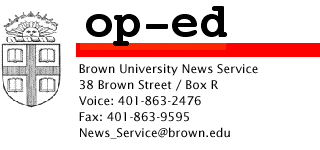

|
Distributed December 2000 Copyright ©2000 by William O. Beeman |
Op-Ed Editor: Janet Kerlin About 540 Words |
|
William O. Beeman The American social drama Nothing could prove the existence of American culture more clearly than the recent presidential controversy and its resolution with the concession speech of Al Gore, and the reconciliation speech of George W. Bush. With these two events, the United States has gone through a textbook cultural process that anthropologists call a social drama. In this process, members of a culture deal with a crisis by reasserting social institutions and cultural values. At times citizens of the United States wonder if there is a true American culture. It seems that other nations have cultures but they are all in Africa or Asia. American society with its multi-cultural makeup seems to lack a culture of its own. Nothing could prove the existence of American culture more clearly than the recent presidential controversy and its resolution with the concession speech of Al Gore, and the reconciliation speech of George W. Bush. With these two events, the United States has gone through a textbook cultural process that anthropologists call a social drama. In this process, members of a culture deal with a crisis by reasserting social institutions and cultural values. The late anthropologist Victor Turner defined the process of a social drama as involving four stages: breech, crisis, redressive action, and reintegration. Although Turner was a specialist in African societies and did work in Asia and Mexico, his model works perfectly for the United States. A breech is a situation that causes a schism in society. The indeterminacy of the presidential election caused just such a split in the nation. The crisis precipitated by this breech is something that cannot be ignored. Otherwise, society threatens to come undone. The resolution of the election was necessary lest American society fly apart. The existence of crisis was undeniable as the wisest people in the nation became confounded by this turn of events. Redressive action is the culturally defined process that resolves the crisis. It is wonderful to see that in the year 2000 American culture remains true to its 19th century roots. As Alexis deTocqueville asserted, political questions in the United States eventually become legal questions. The redressive actions taken to resolve this crisis began as a set of political questions but ended in the courts. Not all Americans liked the results of the U.S. Supreme Court decision that ended the crisis, but they generally accepted it as final. Finally, reintegration eliminates the original breech that precipitated the crisis. This can occur in two ways – by creating a permanent split in society, or by healing. Although a permanent cultural split may still lurk as a threat on the American cultural horizon, for the short term we have experienced a healing. Gore and Bush could not have done better cultural work for Americans in their Wednesday night speeches. Gore’s conciliatory tone, and Bush’s outreach to those who oppose him, were both the kinds of messages that Americans needed to hear. We learn something very important about ourselves in situations like this. First, we understand that we do have very strong cultural values as a nation. Our emotions are aroused when they are tested. Our national institutions are likewise precious to us. We rise to defend them when they are challenged, and accept the solutions they mete out. However, it was as narrow an escape as we have experienced in a long time. Fortunately, one of our American cultural traits is to pay attention to historical memory. This social drama will likely yield prophylactic measures that will prevent similar events in the future. This will not please revolutionaries who long for serious change, but it is strong evidence that American culture exists and endures. William O. Beeman is an anthropologist at Brown University. ###### | |